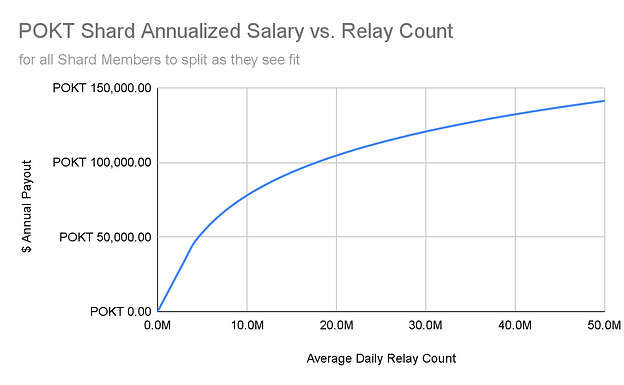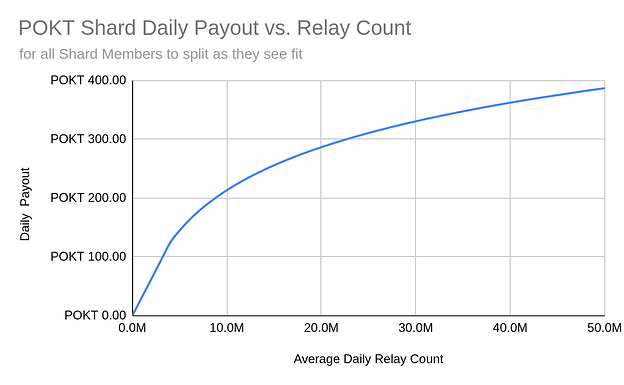Attributes
- Author(s): @eullrich @RichardPokt @jdaugherty @adam
- Recipient(s): Contributors (Triforce Shard Members)
- Category: Allocation of DAO Protocol Revenue
- Related Proposal(s): PEP-34: Triforce Shard Budget (1st Tranche)
- Asking Amount: 0.20% of DAO rewards for shards approved during the remainder of 2022, up to maximum annualized amount of 141,277.37 POKT per shard
Summary
Triforce offers Pocket Network an avenue to scale to 100 blockchains, while minimizing internal resource consumption in people and infrastructure by involving community members at the edges to take additional responsibility for shepherding the protocol more actively. Triforce shards are “Temporary Autonomous Zones” self-governed by the members of each shard (blockchain network) and managed in collaboration with community coordinators. Read more here.
This proposal seeks to incentivize Triforce shards with ongoing supplemental income tied to the success of the shard’s performance as measured by relays served per day. While shards may be serving free tier traffic initially, the expectation will be for shards to serve staked or otherwise paid traffic in the near future.
The incentivization is based on
- The growth of relays over time (on the specific chain that the Shard serves)
- The successful maintenance of the blockchain’s service
- The retention of relays that come through Pocket via Portal accounts, Public PRC endpoints, and SDK installs
- Ongoing Pocket Network brand awareness in the Shard chain ecosystem
- A reliable and consistent service as it pertains to chain service, issues, or questions
POKT is asking for 0.20% of total DAO rewards for the remainder of 2022 to be allocated as income for a maximum of 50 external Triforce shards. Shard Members will be paid out monthly in POKT based on daily relay performance, defined below. If deemed successful, a follow-up proposal will be submitted for the next tranche of shards. This proposal should be viewed as a pilot which expires at the end of 2022 or when 50 shards have successfully launched, whichever happens first. A new proposal would be required to fund this and future sets of shards in 2023 and beyond.
Each shard would be paid on a logarithmic scale that increases in pay till 5mn daily paid relays, and then starts to plateau out till the 50mn daily relay level. The charts below illustrate the relationship.
This model is designed to have rewards plateau at 50mn daily rewards per shard for a maximum of 2.5B total relays per day to safeguard the DAO treasury and inflation targets that PEP until V1 and Portal monetization enables us to revisit a long term model to sustain 100+ shards in perpetuity.
Motivation/Rationale
- To scale to 100 supported blockchain networks by the end of the year.
- Give community members and node service providers an opportunity to seize more responsibility.
- Minimize internal core team resource consumption, reduce centralization risk, increase external PocketDAO resource distribution.
- Provide income based incentives for community members to contribute to the growth of POKT network
- Compliment PEP-34. Shard Budget Proposal with on-going income incentives
Budget
Ongoing Budget: PEP-33: Triforce Shard Income Proposal
- Shard member compensation is tied to performance as measured by relays served per day. Compensation per relay served is paid out in a logarithmic scale as outlined in the chart below.
- Maximum 50 shards
- Maximum 2.5B rewarded daily relays per day
- Maximum Nominal POKT 7,063,868.73
- This budget will be in place for Shards whitelisted in 2022 (including the 5 Shards that have been whitelisted this year prior to this proposal)
- These 5 Shards being
- DFKChain Mainnet
- Fantom Mainet
- Near Mainnet
- Moonbeam Mainnet
- Moonriver Mainnet
- These 5 Shards being
- This budget will be reevaluated at the start of 2023
- If no new proposal is put forth, this current proposal will remain intact
- Of note: These rewards will not come from the 89% rewards share from Node Runners or the 1% rewards share from Validators.
- These Shard Income rewards will come from the PocketDAO and will be supplemental income to contributor (additive to their normal Node Runner rewards)
Hypothetical Scenarios
| Details | Scenario #1 | Scenario #2 | Scenario #3 | Scenario #4 |
|---|---|---|---|---|
| Average Daily Relays | 2.0M | 12.0M | 24.0M | 50.0M |
| Daily POKT rewards given | POKT 62.15 | POKT 232.41 | POKT 306.40 | POKT 387.06 |
| Annual Shard Income* | POKT 22,684.75 | POKT 84,829.35 | POKT 111,834.62 | POKT 141,277.37 |
- shard income to be distributed across shard members as they determine
In the scenarios above, if 0.20% of total POKT minted for a specific chain is approved, this would create financial incentives for the Shard Members to perform their tasks, and for Pocket Network service to remain top-notch. Each scenario differs about how many relays that chain brings.
In short, if Shard Members are serving chains that bring in a couple of million of daily relays, they would get POKT rewards that would sustain their ongoing costs for service, but probably not as much as a full-time Web3 job would bring.
If Shard Members are serving chains that bring in tens of millions of daily relays, they would be handsomely rewarded and would be financially incentivized to keep service good and relay count high.
It is worth noting that TriForce members can also participate in multiple shards so they can accumulate these payouts based on how much they contribute.
Operational Considerations
- Intention of the budget is to compensate individuals for value provided across shard functions: DevOps, Marketing and Business Development.
- The default allocation for a Shard will be 0.20% of total chain POKT rewards divided between the 3 shard members.
- This default can be changed (and is encouraged to be discussed) among the Shard members when they submit their application.
- For example, if a Shard member feels strongly about their task, they can negotiate for 40% of the chain rewards while the remaining 60% would remain to be divided up by the remaining Shard members.
- Any paid applications that are on-boarded via Triforce shards during the lifetime of this proposal will be subject to the same paid accountability measures as future shards, to be determined by a future proposal.
- All compensation paid in POKT token
- Shards will not receive incentives for relays beyond 50mm per day
- Shards will invoice on monthly basis; invoices will be paid to a single account
- Shards will be subject to the expectations listed here.
Deliverables
Upon passing of this proposal, the core team will begin the onboarding process for external parties to launch new chains and be compensated with associated relay growth. All external shards will be subject to the terms and conditions listed in documentation that will be hosted in the Triforce channel on Pocket Networks’ public server.
Dissenting Opinions
There is risk in treating shards as Temporary Autonomous Zones, and thus giving them autonomy over internal financials and operational management. What if internal conflict arises?
Each Shard will be led by a Shard organizer who is accountable for communicating or escalating any Shard changes or conflicts to PNI. The Program Manager will be available to act as a mediator as incidents escalate. Given the subjective reality of effort vs. impact from chain to chain, we believe it is better to give the Shards autonomy on day one to account for variables like organic growth, campaign pacing, and general chain interest.
Shards will not have sufficient resources to succeed without significant support from the core team
While there will be expectations for PNI to help launch and manage Shards, outsourcing communications, content creation, and standing up nodes to external teams of Shards enables us to launch chains in concurrency where we would have been limited to a few at a time. Additionally, as Community Coordinators are hired, opportunities to transfer ownership from PNI to Shards will be explored and implemented.
Furthermore, there is a separate proposal that addresses the upfront costs that a Shard may have with launching support. This proposal is for the ongoing financial incentivization that benefits the community and Shard members.
The overall POKT budget is too much
The DAO is capturing 10% of the overall protocol revenue. In the month of March, the Pocket DAO earned 8.66M POKT. This spend is worth it to reach the milestone of supporting 100 blockchain networks by the end of the year, especially if it liberates the Pocket Core team to focus on other high-leverage, strategic opportunities.
This proposal may seem like a budget ask, but it is directly tied to the growth of the network. When TriForce doles out these tokens, it is generating paid relays in parallel.
This is not enough/too much money for contributors as Shard members
Participation in TriForce is 100% voluntary and if an individual doesn’t find the income too low, another contributor might. Of note - this is additive income so this potential income is supplementary to current ecosystem participant’s income as a node runner or with their typical day job.
Conversely, if the income is too high, contributors would be incentivized to be competitive in submitting applications and providing better service than others to meet demand/meet service needs.
Furthermore, these amounts will be re-voted in 2023 when these proposal amounts expire. These currently proposed amounts could be separately voted on by an alternate proposal.
Copyright
Copyright and related rights waived via CC0 1.

